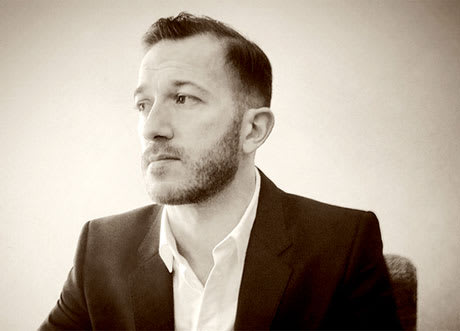Given the avant-garde nature of Colin Stetson's work, it's a welcome surprise that his music has been so well-received by audiences not necessarily steeped in experimental music. His exposure from playing with dozens of acts from Tom Waits to Arcade Fire has undoubtedly helped, but it's down to a combination of the strength of Stetson's vision, musical innovation and sheer hard work that have got him the attention he deserves.
Forming the third and final part in the Montreal-based saxophonist's New History Warfare series, To See More Light features Justin Vernon — with whom Stetson toured as a member of Bon Iver's band — on several tracks. For those familiar with the 2011's New History Warfare Part 2, the Polaris-nominated Judges, the new album follows a similar trajectory with its brooding tonescape, dystopian sci-fi themes and aggressive use of his century-old bass sax. "This one is more of an actual war epic," Stetson says. "It deals with death and love and the inability of our consciousness to imagine its own cessation."
These discomforting themes of loss, struggle and human suffering, although par for the course for a lot of metal bands, are made all the more real in Stetson's compositions without the release valve of chugging guitar riffs to aid catharsis. But why the darkness? "It's the world in the story I'm trying to tell, but also a reflection of the world in the stories that I see every day," Stetson explains. "Anyone who's honest about our history as a people will have some sort of dystopian narrative. Think about 2,000 years ago and how people's lives were filled with a suffering most of us can't fully conceptualise." Yet he concedes, "if you're being realistic in putting that into perspective there has to have been an underlying thread of hope and strength to have kept us in the direction that got us where we are today."
Despite this strife-filled past and sometimes troubling present, Stetson is not pessimistic about our future and a thread of hope can be heard clearly in the arc of the album, which closes with what seems to be a calm resolution. According to Stetson, technological advances such as television, books and the internet, in tandem with the advances in contemplative philosophy, have helped expand our concept of humanity, encouraging a broader capacity for empathy and compassion. "You can see it reflected in the laws of countries all over the world. Think about how dramatically every person's life, especially in the Western world, has changed in the past 100 years. It was only fairly recently that we stopped burning cats for entertainment!"
Despite the specific narrative behind the album, Stetson is quick to point out that you don't need his explanations, or even to listen to the trilogy as a whole, to understand the themes. "More times than not, what people take from it is close to what's originally intended but close-filtered through their experience and that's what it should be. It shouldn't be my experience stamped onto you. You're not reading a memoir."
Forming the third and final part in the Montreal-based saxophonist's New History Warfare series, To See More Light features Justin Vernon — with whom Stetson toured as a member of Bon Iver's band — on several tracks. For those familiar with the 2011's New History Warfare Part 2, the Polaris-nominated Judges, the new album follows a similar trajectory with its brooding tonescape, dystopian sci-fi themes and aggressive use of his century-old bass sax. "This one is more of an actual war epic," Stetson says. "It deals with death and love and the inability of our consciousness to imagine its own cessation."
These discomforting themes of loss, struggle and human suffering, although par for the course for a lot of metal bands, are made all the more real in Stetson's compositions without the release valve of chugging guitar riffs to aid catharsis. But why the darkness? "It's the world in the story I'm trying to tell, but also a reflection of the world in the stories that I see every day," Stetson explains. "Anyone who's honest about our history as a people will have some sort of dystopian narrative. Think about 2,000 years ago and how people's lives were filled with a suffering most of us can't fully conceptualise." Yet he concedes, "if you're being realistic in putting that into perspective there has to have been an underlying thread of hope and strength to have kept us in the direction that got us where we are today."
Despite this strife-filled past and sometimes troubling present, Stetson is not pessimistic about our future and a thread of hope can be heard clearly in the arc of the album, which closes with what seems to be a calm resolution. According to Stetson, technological advances such as television, books and the internet, in tandem with the advances in contemplative philosophy, have helped expand our concept of humanity, encouraging a broader capacity for empathy and compassion. "You can see it reflected in the laws of countries all over the world. Think about how dramatically every person's life, especially in the Western world, has changed in the past 100 years. It was only fairly recently that we stopped burning cats for entertainment!"
Despite the specific narrative behind the album, Stetson is quick to point out that you don't need his explanations, or even to listen to the trilogy as a whole, to understand the themes. "More times than not, what people take from it is close to what's originally intended but close-filtered through their experience and that's what it should be. It shouldn't be my experience stamped onto you. You're not reading a memoir."
